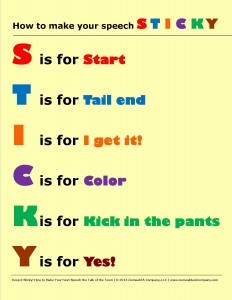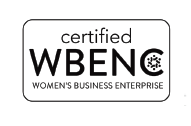More on “Keep it Sticky!” (How to Make Your Next Speech the Talk of the Town)
 I was thrilled to share six ways to make speeches “sticky” with 80 attendees at the Women in Business Networking Lunch ‘N’ Learn Tuesday. (Translation: A sticky speech has the power to help people hear, understand and remember – so it has the power to help people change the world.)
I was thrilled to share six ways to make speeches “sticky” with 80 attendees at the Women in Business Networking Lunch ‘N’ Learn Tuesday. (Translation: A sticky speech has the power to help people hear, understand and remember – so it has the power to help people change the world.)
Here’s a bonus example I didn’t get a chance to share Tuesday.
Enjoy!
I is for “I get it!”
That means “You got me … You touched me … You connected. Now I get it. There’s something in this for me.”
Maya Angelou once said, “… people will never forget how you made them feel.”
So when you speak, make your audience FEEL something!
You can only connect with people if you reach them on some emotional level that makes them say, “I get it!”
When the University of Michigan’s president gave the commencement address at the California Institute of Technology last June, she had a tall order: How could the president of a university from the Great Lakes region possibly connect with students-now-graduates who’d gone to school on the West Coast?
She got a little clever. She connected by making them feel:
As president of the University of Michigan, I can report that Caltech alumni make a significant impact at our institution. Nearly 50 members of our faculty have Caltech ties, with one-third holding Michigan’s most distinguished professorships in research and teaching.
That includes chemist Melanie Sanford, truly one of our star professors …
And James Duderstadt, a nuclear engineer …
And mathematician Philip Hanlon …
Now this is just the world of Caltech in Ann Arbor. Multiply this influence nationally and globally, and you have every reason to be proud of a university that today becomes your alma mater.
After she hooked them by evoking emotion, appealing to their school pride, she didn’t stop there.
She told the graduates:
With this reputation comes obligation. It’s one thing to be smart – which you are. You know that, and Caltech knew it when they admitted you.
It’s quite another achievement to make a lasting impression with your intellect.
One of the great graduates of this institute was Frank Capra. He was the Steven Spielberg of his generation. Given that we’re in the backyard of Hollywood, I think Capra’s remarkable career provides worthy life lessons – lessons about creativity, humanity and impact – some 95 years after his commencement.
She went on to share those three lessons by telling stories from Capra’s life.
But look at how she set that up:
First, she praised her audience for being smart – and then challenged them to make a lasting impression with their intellect.
Second, she did it with humility. Not by telling a University of Michigan story, but by sharing life lessons from their fellow Caltech alum, Frank Capra. (You probably know him as the filmmaker behind that Christmas classic, “It’s a Wonderful Life.”) But the speaker made Capra relevant and real to this 21st century audience by introducing him as “the Steven Spielberg of his generation.”
Her approach: brilliant. Simply because she found so many ways to connect, inspiring her audience to say, “I get it!”

















